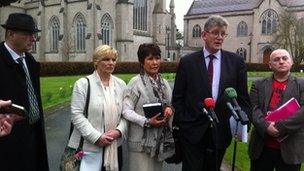Religious orders search for child abuse evidence
- Published

Representatives of abuse survivors spoke to the media following the meeting
A group representing survivors of clerical abuse has been told that a number of religious orders have begun searching their archives for evidence linked to child abuse.
The Northern Ireland Survivors and Victims of Institutional Abuse group (Savia) met Catholic primate Cardinal Sean Brady on Monday.
Representatives of the religious orders were also at the Armagh meeting.
Savia are seeking co-operation with the forthcoming abuse inquiry in NI.
The survivors said they would also be looking for safeguards through the legal process to ensure sight of all relevant records.
The meeting was told three of the orders already had archivists working to collate material. The other order represented had given a commitment to start that process.
Savia want to ensure, via Cardinal Brady, "the unconditional co-operation from the orders who ran institutions where children were placed".
The inquiry will consider allegations dating back to 1945.
Among the delegation was Londonderry man John Heaney who was at Termonbacca home for boys between 1960 and 1967, which was run by the Sisters of Nazareth.
He said those present at the meeting were apologetic and promised to do as much as they could.
"Throughout the rest of my life, there will always be a child within me that is damaged," he said.
"That child has never grown up. That child will always cower down, with certain situations, certain smells, certain things happen in my life, that remind me of where I was and what happened when I was there."
Horrifying
Savia campaigned for the Northern Ireland Executive to hold an inquiry into historical institutional abuse. Final preparations for this are being made by the Office of the First and Deputy First Minister.
It is understood that one part of that process will begin in the next few months.
This is where people are given the opportunity to describe what happened to them in private.
However, the second part of the inquiry, the statutory process, involves a change in Northern Ireland's law which will have to pass through the assembly. This will require more time.
The executive inquiry will include Catholic religious orders, state and voluntary groups.
It follows lengthy judicial examinations of horrifying tales of abuse in the Irish Republic.
- Published12 March 2012
- Published29 September 2011
- Published21 January 2011